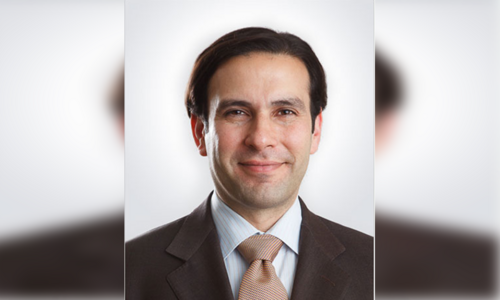WASHINGTON: Former finance minister Hafeez Shaikh is one of the six people still on the board of directors of the Afiniti group whose founder Zia Chishti had to exit the company earlier this week after a sex scandal.
Other members include Jose Maria Aznar, the sixth president of Spain and John Snow, the 73rd US Treasury Secretary. Chishti spent more than a decade building Afiniti and assembled a star-studded roster of advisers -- three former heads of government, including former British Prime Minister David Cameron, and a former US military chief Admiral Mike Mullen.
Cameron, however, quit the board this week, saying that he was not aware of the sexual allegations against Chishti when he joined the firm. Chishti also hired a high-powered sales force that featured a member of the British royal family and a great-grandson of Winston Churchill.
Chishti, who led two billion-dollar companies before he was forced out, previously invented a dental brace Invisalign and launched braces business that is now worth $47 billion.
Chishti was born in Maine, US, in 1971 to a Pakistani mother and an American father. After his father’s death in 1974, he and his mother moved to Lahore. After graduating from the Lahore American School, he returned to the United States and did a BA in computer science and economics from Columbia University, New York, and MBA from Stanford.
Chishti’s sudden fall from grace began on Nov 16 when a former employee of one of his firms, Afiniti, appeared before the House Judiciary Committee and claimed during a publicly televised hearing that Chishti sexually and physically assaulted her soon after she joined the company.
She also stated that the company used internal arbitration to force her not to share her ordeal with the media. Spottiswoode also shared images of her neck and face, showing marks caused by an alleged attack.
The hearing brought together seven witnesses to testify on “how forced arbitration keeps victims of sexual violence and sexual harassment in the shadows”. The committee’s chair Jerry Nadler is working on legislation that would ban the use of forced arbitration in cases of alleged sexual violence and harassment.
One of the witnesses, Eliza Dushku, who worked at CBS, also presented a copy of an article she wrote for the Boston Globe, describing how “I did not want to be sexually harassed. I was fired”.
Another witness, Andowah A. Newton, a legal executive with over 20 years’ experience, spoke about how even legal expertise and degrees from Cornell, Georgetown and Sorbonne failed to protect her. “None of my achievements has protected me from the years of intense retaliation, dehumanisation, and degradation” caused by forced arbitration, she told the committee.
But none were as effective as Spottiswoode. She described how she first met Chishti when she was 12 or 13. “He was a business associate and friend of my father’s,” she said, adding that her father owned Afiniti stock and believed that he and his wife would retire “very comfortably” from the stock.
“When I was in my senior year of college in December 2014, Chishti, who was 43, invited me on a ski trip … but the trip was disguised to groom me,” she told the committee.
Spottiswoode said that after Chishti pursued her for nine months, she agreed to date him but left him after spending some time together.
Months later, Chishti encouraged her to join his company, presenting “a rosy picture of a great career opportunity. Naively, I believed him” after Chishti assured her that he did not expect sexual favours in return.
In April 2016, Spottiswoode signed a contract with Afiniti that included an arbitration with a strong confidentiality clause, which she did not fully understand.
As Spottiswoode started working for the company, she said she realised that Chishti was “not willing to treat me as an employee”.
“Instead, over the next 18 months, he oscillated between pressuring me for sex and punishing me. When I rebuffed him, he humiliated me in front of co-workers and then ignored me completely, causing me to fear for my job,” she told the committee.
Spottiswoode, now a Columbia University law student and friend of Chishti’s daughter, said during a work trip to Brazil Chishti allegedly forced her to have sex with him again.
“I felt completely trapped and hopeless. … I didn’t want to lose my job, … I did not feel that anyone would protect me, and I was too tired to argue with him anymore. I went to his room where he beat me while having sex with me.
“I told him he was hurting me, he said: ‘Good.’ He told me he should have had sex with me when we first met, when I was 13 years old.”
Earlier this week, Afiniti’s Board of Directors announced that Zia Chishti had “stepped down from his role as Chairman, Chief Executive Officer, and Director of Afiniti, effective immediately.”
The Board will make additional organisational announcements in the coming days.
Chishti has rejected the charges as false.
Published in Dawn, November 22nd, 2021














































